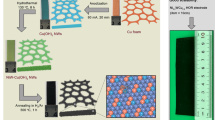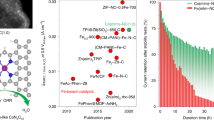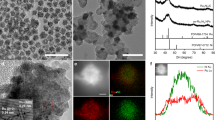Abstract
NOBLE metals have been found to be the most suitable materials as anode catalysts for hydrogen oxidation in low temperature fuel cells containing an acid electrolyte. The one exception is tungsten carbide1, which is the only compound to have shown catalytic activity and sufficient resistance against corrosion in acid media under anodic polarization to act as an anode catalyst. In addition, tungsten carbide (WC) possesses a good electrical conductivity.
This is a preview of subscription content, access via your institution
Access options
Subscribe to this journal
Receive 51 print issues and online access
$199.00 per year
only $3.90 per issue
Buy this article
- Purchase on Springer Link
- Instant access to full article PDF
Prices may be subject to local taxes which are calculated during checkout
Similar content being viewed by others
References
Böhm, H., and Pohl, F. A., Wiss. Ber. AEG-Telefunken, 41, 46 (1968).
Böhm, H., and Pohl, F. A., Proc. Troisièmes Journées Internationales d'Etude des Piles á Combustible, p. 183 (Bruxelles, 1969).
Giner, J., J. Electrochem. Soc., 111, 376 (1964).
Author information
Authors and Affiliations
Rights and permissions
About this article
Cite this article
BÖHM, H. New Non-noble Metal Anode Catalysts for Acid Fuel Cells. Nature 227, 483–484 (1970). https://doi.org/10.1038/227483a0
Received:
Issue Date:
DOI: https://doi.org/10.1038/227483a0
This article is cited by
-
A Novel Approach for Direct Synthesis of Nanocrystalline Tungsten Carbide from Milled Scheelite Ore
Metallurgical and Materials Transactions B (2013)
-
Dehydratisierung von Butanolen an Hartstoffcarbiden
Monatshefte f�r Chemie (1977)
Comments
By submitting a comment you agree to abide by our Terms and Community Guidelines. If you find something abusive or that does not comply with our terms or guidelines please flag it as inappropriate.



